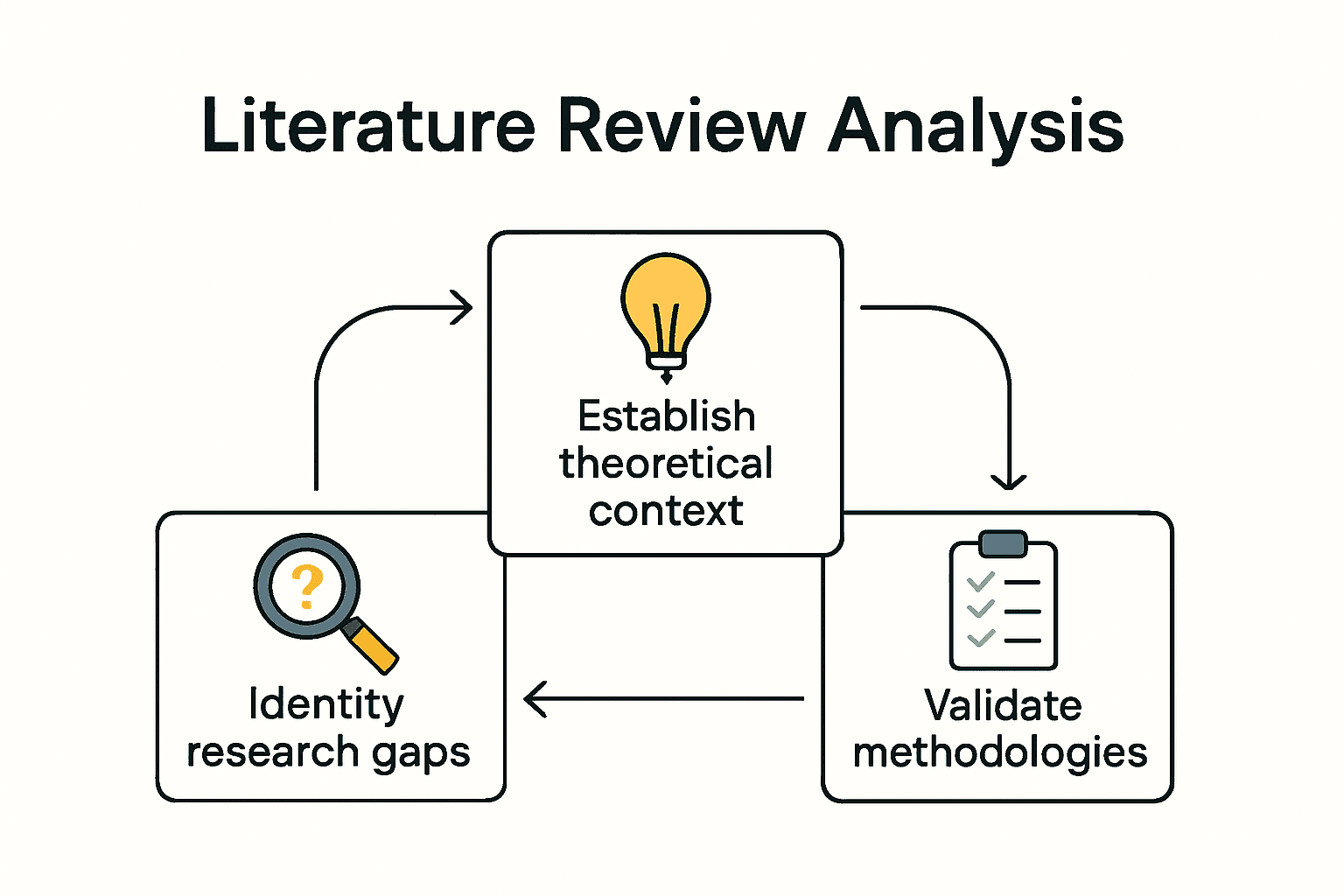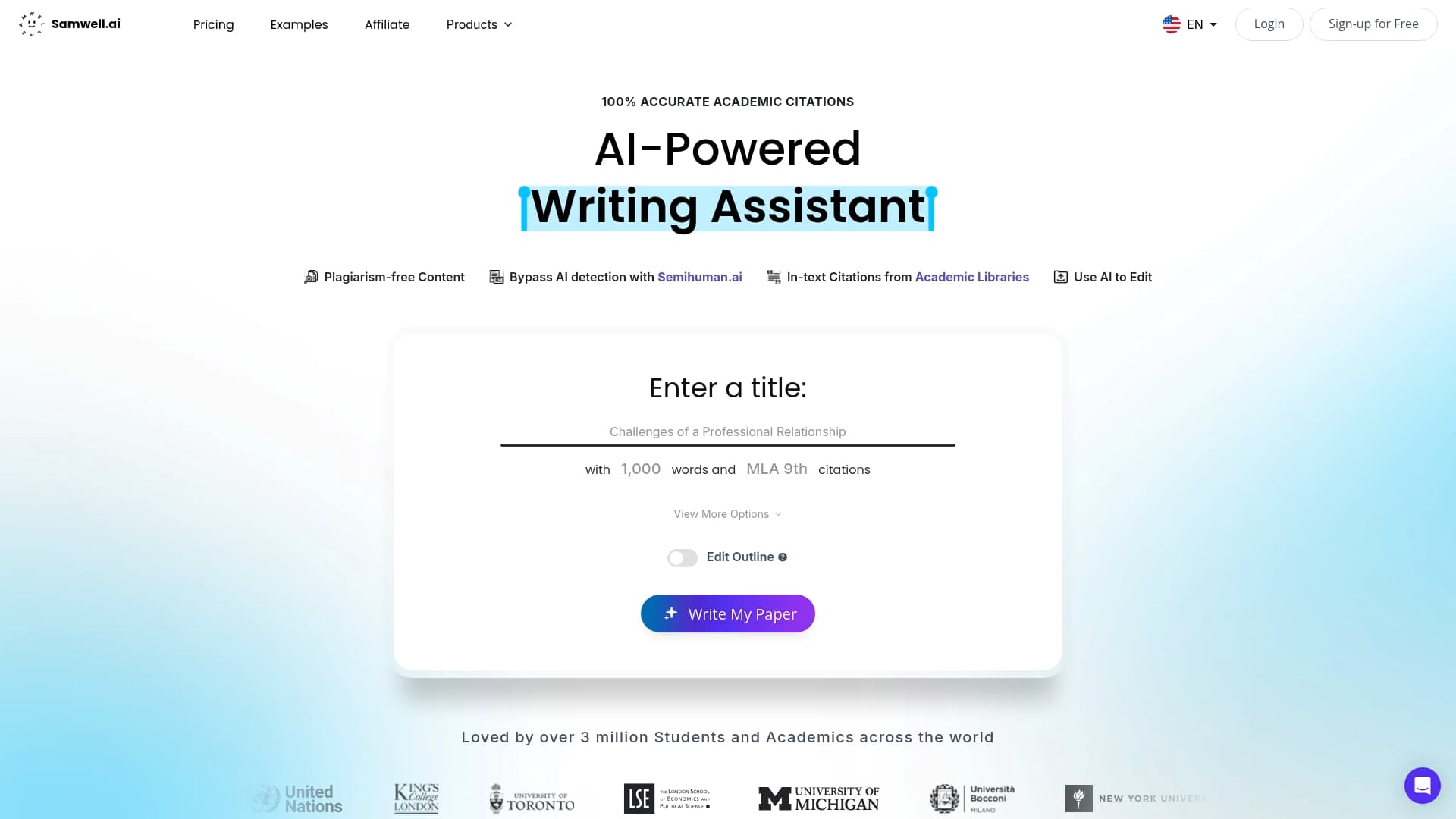Loading...

Mastering a literature review isn’t just about reading piles of research papers. Over 80 percent of successful academic studies highlight a well-analyzed literature review as their foundation. That sounds impressive, but here’s the surprise. Most researchers actually struggle to find clear research gaps and spend hours lost in data. Here’s the real twist. With the right strategies and a bit of modern tech, analyzing literature in 2025 can become faster, more focused, and even enjoyable.
| Takeaway | Explanation |
|---|---|
| Identify Research Gaps | Pinpoint unexplored areas by systematically analyzing previous studies. This process aids in contributing to academic discourse and guiding future research efforts. |
| Utilize Structured Analysis Methods | Implement systematic methodologies such as research question formulation, comprehensive searches, and analytical synthesis to extract meaningful insights from literature. |
| Leverage Advanced Tools and Strategies | Use technological advancements like AI and machine learning to manage and analyze large volumes of literature effectively, enhancing the efficiency of research processes. |
| Establish Clear Research Parameters | Define precise research boundaries and utilize frameworks such as PICO to maintain methodological consistency and clarity in the literature review. |
| Develop Effective Synthesis Techniques | Move beyond summarization by employing thematic mapping and critical comparative analysis to create coherent scholarly arguments and identify connections among studies. |
Researchers recognize literature review analysis as a foundational process for academic and scientific inquiry. This systematic approach enables scholars to comprehensively examine existing research, establish theoretical frameworks, and identify critical knowledge gaps in their field of study.
Literature review analysis represents a strategic method of critically evaluating and synthesizing scholarly publications to develop a nuanced understanding of a research topic. Explore our comprehensive guide on research methods to understand how this process transforms raw academic information into structured insights.
According to research from the University of Delaware, a robust literature review serves multiple critical functions. It helps researchers avoid redundant studies, understand existing methodological approaches, and position their work within the broader academic conversation. By systematically analyzing previous research, scholars can:

The strategic significance of literature review analysis extends beyond mere information compilation. Research from HEC Montreal indicates that a well-executed literature review demonstrates a researcher's comprehensive understanding of their field, enhancing the credibility and scientific rigor of subsequent studies.
Effective literature review analysis involves more than passive reading. Researchers must actively engage with scholarly publications, critically assessing methodologies, identifying patterns, and synthesizing complex information. This process requires careful attention to detail, analytical thinking, and the ability to draw meaningful connections across different research studies.
Modern literature review analysis increasingly leverages advanced technological tools and digital databases. Researchers can now access vast repositories of scholarly work, allowing for more comprehensive and nuanced investigations. The integration of artificial intelligence and machine learning technologies is transforming how scholars conduct literature reviews, enabling more efficient and sophisticated analysis techniques.
By understanding the multifaceted role of literature review analysis, researchers can develop more robust, innovative, and impactful studies that contribute meaningfully to their academic disciplines. The ability to critically evaluate existing research while identifying promising new directions remains a fundamental skill for scholars across various fields of study.
Analyzing a literature review requires a systematic and strategic approach that goes beyond simple text compilation. Researchers must employ sophisticated methods to extract meaningful insights, critically evaluate existing research, and synthesize complex academic information effectively.
Learn advanced research techniques in our comprehensive academic guide to understand the intricacies of literature review analysis. According to research from the National Institutes of Health, conducting a robust literature review involves six critical steps:
Below is a table that summarizes the six critical steps of a systematic literature review for easier reference.
| Step | Purpose | Example Action |
|---|---|---|
| Research Question Formulation | Define specific, focused research aims | Develop a precise research question |
| Comprehensive Literature Search | Gather all relevant academic sources | Search multiple scholarly databases |
| Systematic Screening | Apply selection criteria to include/exclude studies | Filter by inclusion/exclusion rules |
| Quality Assessment | Evaluate validity and rigor of selected studies | Assess methodological quality |
| Data Extraction | Collect key information from studies | Record essential data findings |
| Analytical Synthesis | Integrate findings to form new insights | Summarize and interpret results |
Research from Washington State University Libraries emphasizes the importance of critical appraisal in literature review analysis. This method involves a detailed evaluation of research studies focusing on several key dimensions:
Newcastle University research highlights multiple approaches to literature synthesis, each offering unique perspectives for organizing and analyzing academic research:
Below is a table comparing different structural approaches to literature synthesis, helping you decide which method best fits your research needs.
| Approach | Organizing Principle | Best Used For | Key Characteristics |
|---|---|---|---|
| Chronological | Timeline/history of research | Subjects with clear historical development | Tracks evolution over time |
| Thematic | Grouped by concepts/themes | Topics with multiple key themes | Clusters research by recurring themes |
| Funnel Method | Broad-to-narrow focus | Broad fields narrowing to a specific topic | Moves from general context to specifics |
| Comparative Analysis | Comparison of studies/approaches | Contrasting methodologies/contexts | Highlights similarities and differences |
Modern literature review analysis increasingly integrates advanced technological tools. Artificial intelligence and machine learning algorithms now assist researchers in processing large volumes of academic literature, identifying patterns, and generating sophisticated insights that were previously challenging to extract.
Successful literature review analysis requires more than technical skills. Researchers must cultivate critical thinking, maintain academic objectivity, and develop a nuanced understanding of complex research landscapes. By combining systematic methodologies with innovative analytical approaches, scholars can transform raw academic data into meaningful scholarly contributions that advance knowledge in their respective fields.
Researchers seeking to conduct comprehensive literature reviews require strategic tools and techniques that enhance the efficiency and accuracy of their academic investigations. Mastering these practical approaches can significantly improve the quality and depth of research analysis.

Explore our comprehensive research methodology guide to understand sophisticated research techniques. According to research from advanced academic platforms, developing systematic search strategies is crucial for effective literature review analysis. Key techniques include:
Research from Medwin Publications highlights the importance of reference management tools. Modern researchers can leverage advanced digital platforms to streamline their academic workflow:
Critical Appraisal Research emphasizes the significance of structured evaluation methods. Implementing systematic assessment frameworks ensures rigorous academic analysis:
Technological advancements are transforming literature review processes. Artificial intelligence and machine learning algorithms now offer unprecedented capabilities in processing large academic databases, identifying complex research patterns, and generating sophisticated analytical insights.
Successful literature review analysis demands more than technical proficiency. Researchers must cultivate critical thinking skills, maintain academic objectivity, and develop a nuanced understanding of complex research landscapes. By integrating advanced technological tools with rigorous analytical methodologies, scholars can transform raw academic data into meaningful scholarly contributions that push the boundaries of existing knowledge.
The most effective researchers approach literature review analysis as an iterative process. Continuous learning, adaptability, and a commitment to methodological precision remain fundamental to producing high quality academic work that advances understanding in their respective fields.
Literature review analysis presents researchers with complex challenges that require strategic approaches and innovative problem-solving techniques. Understanding these obstacles and developing effective mitigation strategies is crucial for producing high-quality academic research.
Explore our comprehensive research methodology guide to navigate research challenges effectively. According to research from PhD academic resources, establishing clear research boundaries is fundamental to successful literature review analysis.
Researchers can overcome parameter challenges by:
Research from Nonprofit Resource Centers highlights the critical challenge of managing extensive academic information. Researchers frequently encounter overwhelming volumes of potential sources, requiring sophisticated management strategies:
Advanced Research Methodology Analysis emphasizes the importance of moving beyond simple source summarization. Effective synthesis requires sophisticated analytical approaches:
Technological advancements are increasingly supporting researchers in addressing these challenges. Artificial intelligence and machine learning algorithms now provide sophisticated tools for processing complex academic databases, identifying nuanced research patterns, and generating insights that were previously challenging to extract.
Successful literature review analysis demands more than technical skills. Researchers must cultivate adaptability, critical thinking, and a commitment to methodological precision. By developing robust strategies for managing research challenges, scholars can transform potential obstacles into opportunities for generating innovative and meaningful academic contributions.
The most effective researchers approach literature review challenges as iterative learning experiences. Continuous refinement of methodological approaches, openness to technological innovations, and a willingness to challenge existing research paradigms are essential for producing high-quality scholarly work that advances knowledge in their respective fields.
Literature review analysis is a systematic method of critically evaluating and synthesizing scholarly publications to develop a nuanced understanding of a research topic. It helps identify research gaps, establish theoretical contexts, and validate research methodologies.
A literature review is crucial for academic research as it demonstrates a researcher’s comprehensive understanding of their field, enhances credibility, and provides essential insights for future studies. It allows researchers to engage with existing research and identify gaps in knowledge.
Key methods for conducting a literature review analysis include systematic analysis techniques, critical appraisal methodology, and structural approaches to literature synthesis. These methods help in structuring the review and deriving meaningful insights from existing research.
Technology assists in literature review analysis by providing advanced tools such as AI and machine learning algorithms that help manage large volumes of literature, identify patterns, and generate insightful analyses more efficiently.
Struggling to identify research gaps or synthesize complex information in your literature review? If you find yourself overwhelmed by endless sources or worried about maintaining academic integrity, you are not alone. As highlighted in our article, analyzing literature reviews in 2025 means tackling information overload, defining clear research parameters, and leveraging modern tools for efficiency and accuracy.

Take control of your academic writing with Samwell.ai. Experience how our platform uses Semihuman.ai technology to minimize plagiarism risks, ensures your work aligns with MLA or APA standards, and provides real-time AI detection. Use features such as the Power Editor and Guided Essays to refine your analysis and structure your next paper. Join over one million students and professionals who have turned academic challenges into opportunities for success.
Do not let complexity slow your progress. Visit Samwell.ai now to upgrade your literature review process and move confidently from analysis to publication.



